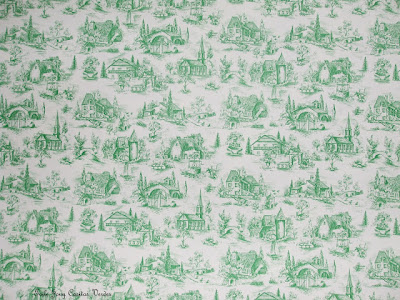I don’t have any creations to unveil yet,
so I thought maybe I could share some of the different prints and fabrics I’m
using as inspiration and give you a general feel of what LaurenPearl is all
about!
There is no better place to start than the
beautiful Toile De Jouy, which is my favourite print at the moment. Normally I
wouldn’t go for prints like this, as I like something quirky and bright some
might say a bit garish. There is something very classy and all together proper
about a good toile. Now I might hear some of you say...... what is a toile du jouy, but I guarantee you will know the
print!
The History of Toile De Jouy
So lets start at the beginning of the
toile’s journey, which is around the end of the seventeenth century when Europe
finds and takes ownership of a certain print that include bright flowers as well as
animal painted toiles, the origin of these toiles were imports from India.
As these designs were so popular and a
competitor to factories in France, this caused Louis XIV (14th) to
have a bit of a hissy fit and ban nation wide import and production, finally in
1759 he got over it and lifted the ban.
In the mean time Christophe-Phillipe
Oberkampf from Wurtemburg saw an opportunity after the ban and opened a factory
in Jouy-en-Josas, which specialised in printed cotton. It soon became one of the most important in
Europe. Oberkampf was inspired by Indian
printing techniques, that he used at Jouy and was able to obtain solid colour
by the application of mordants (dyes) in the form of metallic salts onto the
material, this was then developed by dipping in a vat of madder roots (a type
of dye). The mordants use three different techniques Wood, copper plate and
copper roller.
In the first ten years the factory created
polychrome, wood block prints in a floral and botanical design this was mainly
used for clothing (society ladies dresses!) In 1770, monochrome copper plate
prints were used and allowed the fabric to be put on furniture. Later in 1797 copper rollers were introduced
and a new style was created which allowed geometric forms that were mixed with
antiquity and mythological creatures.
Toile De Jouy today
With more that 30,00 original Toile De Jouy designs, it is going to be hard finding
an original design to adapt to this style.
Printing methods have most definitely
evolved and gone are the days of wood block printing. We are now more likely to
see a Toile hand painted or screen printed. The fabric also no longer needs to
be created in Jouy-en-Josas to be called Toile De Jouy, we now recognise this
print as designs that depict country scenes and are normally in black, purple,
red or the most popular blue.
There is even a museum that can be visited
that will tell you all about the history of this wonderful fabric and
technique.
Below are some examples of fabric I have
been looking at, I would just like to stress that none of the below are my
designs and have been taken from different sites all over the web.


I’m off to V festival over the weekend, so
I hope to report to you on lots of lovely festival inspired fabric.
Lots of love,





No comments :
Post a Comment